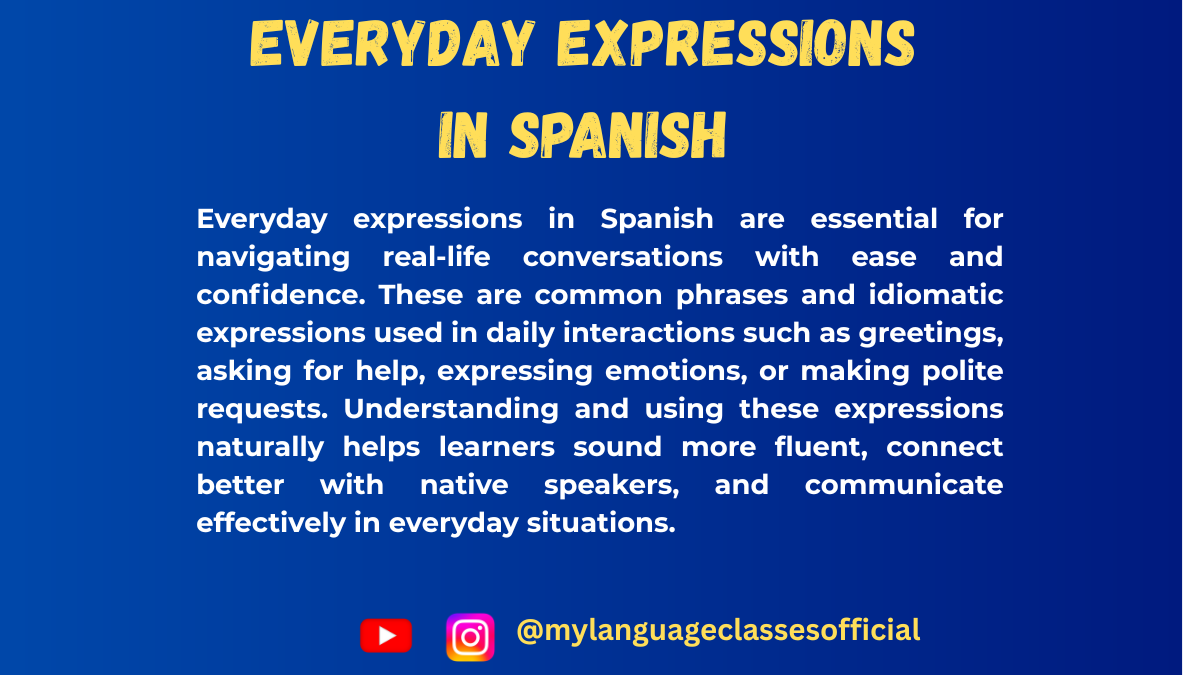Your cart is currently empty!
Common Spanish Expressions for Everyday Conversations

Common Spanish Expressions for Everyday Conversations
Learning Spanish can feel like unlocking a world of new opportunities. Whether you’re planning a trip, meeting new friends, or simply expanding your linguistic horizons, mastering common Spanish expressions is key. In this post, we’ll explore essential phrases related to Spanish greetings, farewells, introductions, preferences, and daily routines. Along the way, you’ll get useful Spanish grammar tips to improve your understanding of gender in Spanish grammar, articles in Spanish, plural forms in Spanish, and more. Let’s dive in!
Greetings and Farewells
Common Greetings:
- Hola — Hello.
- Example: “Hola, ¿cómo estás?” (Hello, how are you?)
- Buenos días — Good morning.
- Example: “Buenos días, ¿todo bien?” (Good morning, everything okay?)
- Buenas tardes — Good afternoon.
- Example: “Buenas tardes, señor.” (Good afternoon, sir.)
- Buenas noches — Good evening / Good night.
- Example: “Buenas noches, que descanses.” (Good night, rest well.)
Common Farewells:
- Adiós — Goodbye.
- Example: “Adiós, nos vemos mañana.” (Goodbye, see you tomorrow.)
- Hasta luego — See you later.
- Example: “Hasta luego, que te vaya bien.” (See you later, take care.)
- Nos vemos — See you.
- Example: “Nos vemos en la fiesta.” (See you at the party.)
- Chao — Bye (informal).
- Example: “Chao, hasta pronto.” (Bye, see you soon.)
Introductions
Introducing Yourself:
- Me llamo… — My name is…
- Example: “Me llamo Ana.” (My name is Ana.)
- Soy… — I am…
- Example: “Soy Carlos.” (I am Carlos.)
- ¿Cómo te llamas? — What’s your name?
- Example: “¿Cómo te llamas? Yo soy Sofía.” (What’s your name? I’m Sofía.)
Asking About Others:
- ¿De dónde eres? — Where are you from?
- Example: “¿De dónde eres? Soy de México.” (Where are you from? I’m from Mexico.)
- Mucho gusto — Nice to meet you.
- Example: “Mucho gusto, María.” (Nice to meet you, María.)
- Encantado/a — Delighted (to meet you).
- Example: “Encantado de conocerte.” (Delighted to meet you.)
Talking About Likes and Dislikes
Expressing Likes:
- Me gusta… — I like…
- Example: “Me gusta el cine.” (I like the cinema.)
- Me encanta… — I love…
- Example: “Me encanta la música.” (I love music.)
- ¿Qué te gusta? — What do you like?
- Example: “¿Qué te gusta hacer?” (What do you like to do?)
Expressing Dislikes:
- No me gusta… — I don’t like…
- Example: “No me gusta el café.” (I don’t like coffee.)
- Odio… — I hate…
- Example: “Odio levantarme temprano.” (I hate waking up early.)
Talking About Daily Routines
Common Reflexive Verbs in Daily Routines:
- Despertarse (e-ie) — To wake up.
- Example: “Me despierto a las siete.” (I wake up at seven.)
- Levantarse — To get up.
- Example: “Me levanto de lunes a viernes a las seis.” (I get up at six from Monday to Friday.)
- Trabajar — To work.
- Example: “Trabajo de nueve a cinco.” (I work from nine to five.)
- Cenar — To have dinner.
- Example: “Ceno con mi familia todos los días.” (I have dinner with my family every day.)
Example Daily Routine:
- Por la mañana: Me levanto temprano, me ducho y desayuno.
- Por la tarde: Trabajo hasta las cinco y después hago ejercicio.
- Por la noche: Ceno y leo un libro antes de dormir.
Grammar Tips for Beginners
Gender in Spanish Grammar:
- Spanish nouns have gender (masculine or feminine).
- Masculine: Usually end in “-o” (e.g., el niño).
- Feminine: Usually end in “-a” (e.g., la niña).
Articles in Spanish:
- Use el (masculine singular) and la (feminine singular).
- Example: El perro (The dog), La casa (The house).
- For plurals: los (masculine plural) and las (feminine plural).
- Example: Los perros (The dogs), Las casas (The houses).
Reflexive Verbs:
- Reflexive verbs are used for actions done to oneself.
- Example: Me ducho (I shower myself), Se viste (He/She gets dressed).
Spanish Conversation Tips
- Practice pronouncing vowels clearly. Spanish vowels are short and consistent.
- Be mindful of verb conjugations depending on the subject.
- Remember to match articles and adjectives with the gender and number of nouns.
- Example: Un niño feliz (A happy boy), Una niña feliz (A happy girl).
- Use gestures and expressions to aid communication while learning.
Conclusion
Mastering basic Spanish phrases can make your interactions smoother and more enjoyable. Practice these useful Spanish expressions daily, and don’t be afraid to make mistakes—it’s all part of the learning process! Whether you’re learning how to say hello in Spanish, how to introduce yourself in Spanish, or how to talk about preferences in Spanish, these expressions will set a strong foundation for fluency. Happy learning! ¡Buena suerte!
If you found this guide helpful, I’d love to hear from you! Share your thoughts in the comments below or connect with me on social media. For more tips, resources, and inspiration, visit my blog at mylanguageclasses.in. Follow on Instagram and subscribe on YouTube
📚 Continue Learning Spanish
Comments
8 responses to “Common Spanish Expressions for Everyday Conversations”
-
[…] Common Spanish Expressions for Everyday Conversations | My Language Classes […]
-
[…] Common Spanish Expressions for Everyday Conversations | My Language Classes […]
-
[…] Common Spanish Expressions for Everyday Conversations | My Language Classes […]
-
[…] Common Spanish Expressions for Everyday Conversations | My Language Classes […]
-
[…] Common Spanish Expressions for Everyday Conversations | My Language Classes […]
-
[…] Common Spanish Expressions for Everyday Conversations | My Language Classes […]
-
[…] Common Spanish Expressions for Everyday Conversations | My Language Classes […]
-
[…] Common Spanish Expressions for Everyday Conversations | My Language Classes […]

Leave a Reply